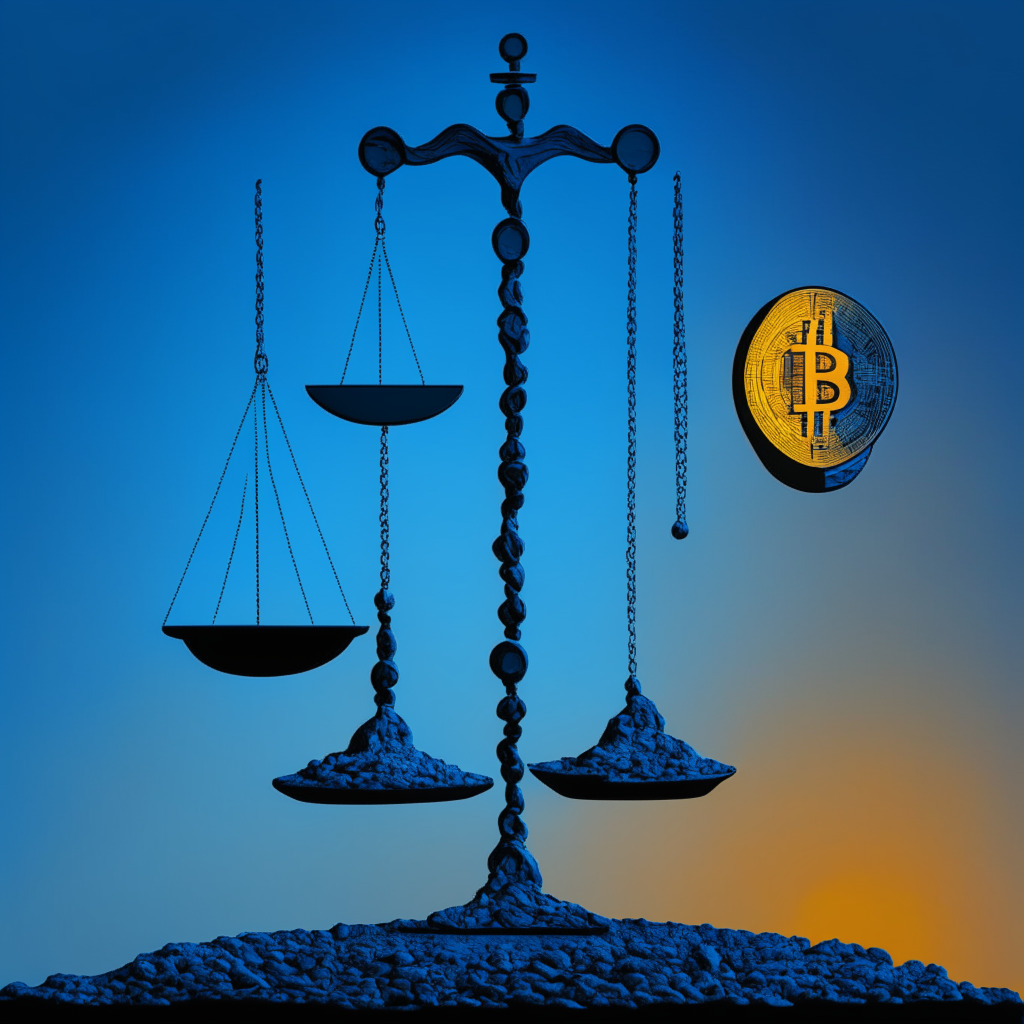Australia’s big four bank, ANZ, has successfully conducted a test transaction with Web3 services platform, Chainlink, marking a significant move towards embracing tokenized assets. Utilizing Chainlink’s Cross-Chain Interoperability Protocol (CCIP), ANZ simulates the purchase of a tokenized asset adopting a ‘test-and-learn’ approach.
Search Results for: ANZ
ANZ’s Leap into Crypto with A$DC: Groundbreaking Future or Controlled Volatility?
ANZ, a leading Australian bank, recently successfully executed a test transaction for A$DC, its bank-issued stablecoin, on Chainlink’s CCIP. This move shows the potential of blockchain technology in transforming the banking industry and reflects the tension among financial institutions over customer exposure to digital currencies.
Breaking Down Launchpad XYZ: The Presale Bonanza and Beyond for Crypto Curious Investors
“Launchpad XYZ’s recent updates prioritise platform engagement over quick trades, introducing a 20% bonus for presale contributors and a five-tiered premium access pass system. The platform also offers AI-powered solutions, educational features, and the Launchpad Quotient (LPQ) to rank and analyze digital assets.”
DeFi Deviation: Aave’s Rocky Road or Green Crypto Chimpanzee’s Rising Star
“In the aftermath of a $47m cyber exploit on Cure liquidity pools, DeFi markets and cryptocurrencies like Aave face a challenging future. Some investors are now focusing on innovative projects like Green Crypto Chimpanzee, which integrate environmental sustainability into blockchain technology, offering alternative investment platforms.”
PayPal’s Integration with Crypto.com: Pioneer Move or Futile Endeavor?
The cryptocurrency exchange Crypto.com and financial powerhouse PayPal have partnered, with Crypto.com becoming an exchange of choice for PayPal’s stablecoin, PYUSD. By facilitating PYUSD trading pairs, Crypto.com aims to connect over 80 million users to new crypto innovations while supporting PayPal’s extensive network.
Unraveling PayPal’s Plan: Crypto.com, Stablecoin and the Future of Cryptocurrency Markets
“PayPal has plans to make Crypto.com the preferred platform for their USD-backed stablecoin, PYUSD. Despite skepticism around adoption and seamless trade, this move could mark a significant stride towards widespread crypto adoption in traditional finance.”
Decoding Chainlink’s Multisig Wallet Controversy: Centralization Concerns Vs. Market Performance
Chainlink recently altered its multisig wallet’s signature rule, shifting from a 4-of-9 to a 4-of-8 requirement. Critics suggest this change and removal of a wallet address may indicate potential centralized control risking the DeFi ecosystem’s integrity. Regardless, Chainlink maintains its utility in DeFi projects and its token value keeps growing.
Accidental Bitcoin Windfall: To Return or Not to Return? An Ethical Dilemma in Crypto Mining
“A Bitcoin miner named Chun received an unexpected reward of 20 BTC for validating a 0.008 BTC transaction from crypto exchange Paxos due to a system fault. A debate ensues within the crypto community whether Chun should return the erroneous windfall.”
Emerging Crypto Landscape in Asia: Boon or Bane for Institutional Adoption?
“Institutional adoption of digital assets in Asia is on the rise due to improved regulatory clarity, with key adopters including South Korea, Hong Kong, Japan, and Singapore. However, progress varies across countries. Despite hurdles, the digital asset market’s infrastructure has noticeably strengthened, indicating increased market maturity.”
Bitcoin on the Brink: Will the Crypto Giant Master the Stormy Seas of Market Volatility?
“In the stormy seas of cryptomarkets, Bitcoin’s stability is being questioned as it hovers around a crucial value. Amid less volatility and ongoing discussions about the impact of the U.S.’s first Bitcoin spot price ETF, there’s divided opinion about the future of Bitcoin and other cryptocurrencies. Will Bitcoin bounce back or plummet? Only time will tell.”
Navigating Regulatory Waters: How Seba’s Expansion Reflects the State of Crypto Banking
Switzerland-based crypto bank, Seba, has received approval-in-principle from Hong Kong’s Securities and Futures Commission. This is an initial step towards gaining a full license for operations with cryptocurrency-related products and traditional securities. Seba’s move correlates with Hong Kong’s new regulatory measures aiming to attract companies into the region.
Swiss SEBA Bank Navigates Hong Kong’s Evolving Crypto Regulatory Landscape
The Swiss-based SEBA Bank, known for its crypto friendliness, has made a significant stride towards offering crypto services in Hong Kong, securing approval-in-principle from the city’s Securities and Futures Commission. This move reflects SEBA’s strategic push to align with Hong Kong’s evolving crypto regulations and to strengthen its regulated presence across the Asia Pacific region.
The Resistance and the Dance: Australia’s Dual Approach to Cryptocurrency
Major Australian banks are imposing restrictions on customers’ ability to transact with crypto exchanges. In response, Australian crypto exchange, Independent Reserve, has formed a groundbreaking partnership with Paypal, enabling customers to fund their crypto accounts using their Paypal wallets despite these banking restrictions.
World Mobile’s Decentralized Service Expansion: Democratizing Internet Access with Blockchain and AI
World Mobile, a decentralized mobile internet provider, has expanded its services via Google Play, allowing users in select countries to leverage blockchain for cost-effective internet access. This blockchain-based project promotes telecom sharing economy and integrates AI solutions for enhanced customer service, thereby democratizing technology and wealth access.
Blockchain vs Traditional Payments: A Detailed Analysis of Utility, Constraints and Potential
Cross-border payments demonstrate the utility of digital currencies, yet adoption faces challenges like technological issues, competition, and regulatory constraints. Blockchain Officer, Paul Brody, suggests basic fiat payments are faster and cheaper through centralized systems, while blockchain payments can impact speed and cost due to duplication across nodes. Blockchain’s potential may not lie in replacing existing models, but in altering the transaction rules through tokenization and inherent programmability.
Surge in Stablecoin Use Amid Argentina’s Political Turmoil: A Deep Dive into Crypto’s Role in National Economy
Amidst Argentina’s economic crisis and hyperinflation, Argentinians are significantly increasing their purchase of stablecoins as a viable way to protect their savings. The trend, spurred by government restrictions on foreign currency buying and a depreciating peso, also sees an increasing number of transactions and salaries being paid in cryptocurrencies. The upsurge coincides with the rise of presidential candidate, Javier Milei, who holds a positive stance towards cryptocurrencies.
Will Argentina Emerge as a Bitcoin Haven Amid its Economic Crisis? Exploring the Possibilities and Challenges
Argentinian economist and politician, Diana Mondino, has hinted that Argentina might soon become a ‘Bitcoin haven’. Her party’s leader, Javier Milei, also supports Bitcoin, fuelling speculation about the country’s warming stance on cryptocurrencies. Despite this, their preferred solution to Argentina’s inflation crisis is dollarization, suggesting dollar dominance over crypto presently.
Navigating Bitcoin’s Wild Ride: Triumph or Tragedy Looming? Exploring Market Contradictions
“The price of Bitcoin (BTC) has reached a four-day high nearing $29,600, hinting at changes in volatility. However, a critical resistance zone needs to be flipped for continuation. The U.S. dollar index receding and strict action from Chinese authorities add layers of complexity and uncertainty in the global cryptocurrency landscape, blurring the line between risk and opportunity.”
Bitcoin Advocate Leading Argentine Primary Elections: Implications for Economic Future
Javier Milei, a libertarian candidate known for supporting Bitcoin and criticizing central banks, is leading in Argentina’s primary presidential election. Despite his enthusiasm for Bitcoin, Milei doesn’t advocate for its adoption as legal tender, instead promoting “dollarization” to combat rampant inflation.
Regulation Vs. Innovation: The Tug of War Impacting Crypto Markets
“The SEC’s recent decision to postpone and seek public opinion on Ark Invest’s Bitcoin ETF application reveals the uncertainties that potential regulatory implications pose to the crypto universe. Crypto assets such as Fantom, Shibie, Rocket Pool, Chimpanzee, and Sui have attracted attention, displaying the ongoing tug between bullish optimism and regulatory caution.”
Base Network Launch: User Onboarding Ease Vs. Early Adopter Risks
The Base network’s official launch signals progress in blockchain innovation, potentially offering opportunities in Web3 apps and DeFi. However, with past incidents resulting in large losses, these advances remind early adopters of the high risks accompanying digital spaces.
MicroStrategy’s Bitcoin-Centric Business Model: A Paradigm Shift or a Perilous Risk?
MicroStrategy (MSTR), a software intelligence firm, astoundingly transitions all its earnings into Bitcoin as a long-term strategy, believing Bitcoin to exceed its metallic and fiat counterparts as a superior store of value. The company, which owns approximately 152,333 bitcoins equating to around $4.5 billion, has seen its shares soaring by 207% this year. This Bitcoin-centric approach might pioneer a new paradigm in future corporate strategies.
NFT Royalties on a Downtrend: A Blow to Creators or a Necessary Adjustment for Market Stability?
NFT royalty payments have dramatically declined, hitting a two-year low in June, according to data analytics platform, Nansen. A growing trend of royalty-optional marketplaces and policies of established platforms like OpenSea seem to influence this dwindling trend. Despite the radical drop, certain ‘blue-chip’ collections continue earning millions in royalties.
Expanding Cryptocurrency Custody: Fireblocks Partners with Cloud Giants, Security Concerns Linger
Cryptocurrency custody technology provider Fireblocks has expanded its support to cloud service providers including Amazon Web Services, Google Cloud Platform, Alibaba Cloud, Thales, and Securosus, aiming to cater to banks using on-premise and cloud-based IT infrastructures.
Azuki Elementals: The Future of NFTs or a Passing Fad? Blockchain Art and Market Prospects
Azuki announces the Azuki Elementals collection, featuring 20,000 NFTs representing earth, fire, lightning, and water. With varied rarity traits, it’s drawing interest from enthusiasts and collectors. The Dutch Auction offers a starting price of 2 ETH, targeting current holders of Azuki NFTs or BEANZ.
The Azuki Elementals NFT Release: Expanding the Anime Universe and Fueling Anticipation
Chiru Labs releases 20,000 Azuki Elementals NFTs, expanding its popular Ethereum-based Azuki collection. With a Dutch auction for the remaining Elementals, current Azuki NFT holders get a preferential pre-sale window. The four distinctive kingdoms-themed Elementals continue Azuki’s impressive success in the NFT market.
Bitcoin’s Struggle to $40K: Analyzing Barriers and Market Influencers Amid Economic Uncertainty
Bitcoin hit a one-year high of $31,400, but Bloomberg Intelligence’s Mike McGlone cautions headwinds could impede progress towards $40,000. Factors like the potential US recession, equity bear market, and hawkish central banks could influence Bitcoin’s performance.
Collapse of Crypto-Friendly Banks: Time to Rethink Deposit Insurance Limits?
Circle and Sequoia Capital were among top depositors in collapsed Silicon Valley Bank (SVB), raising concerns about depositor fund security and current regulations in the crypto space. The situation highlights the potential need for increased deposit insurance limits as more financial institutions embrace cryptocurrencies and blockchain technology.
Bitcoin Ambassadors Drive Crypto Awareness in 8,000km European Rally Adventure
The Bitcoin Ambassadors team is participating in an 8,000-kilometer European rally car adventure, promoting cryptocurrency adoption and raising money for charity. Equipped with a Bitcoin candy machine and remote-play jukebox, their goal is to engage in conversations and educate people about the benefits of cryptocurrencies.
Swift, Chainlink, and Banks: Unlocking Blockchain’s Future in Finance
Swift, Chainlink, and major financial institutions like ANZ, BNP Paribas, and BNY Mellon are collaborating to explore blockchain technology’s potential in transferring tokenized assets across networks. The experiment aims to increase market liquidity and contribute to the blockchain industry’s growth beyond single-digit trillions.
First eAUD Foreign Exchange Transaction: Future of CBDCs and Pros-Cons Debate
Australia successfully completed its first foreign exchange transaction using eAUD, marking a milestone in the country’s central bank digital currency (CBDC) development. The eAUD transaction showcased quicker settlement and potential benefits over traditional FX, remittance networks, and fiat currencies. The ongoing pilot explores various eAUD use-cases, driving the world closer to CBDC integration in financial systems.
Coinbase’s Global Advisory Council: Navigating Crypto Regulations with Former US Lawmakers
Coinbase launches its Global Advisory Council, including former US lawmakers Patrick Toomey, Tim Ryan, and Patrick Maloney, to navigate crypto regulations. The council aims to collaborate with regulators, shaping the future of cryptocurrency and bridging the gap between regulators and innovators.































